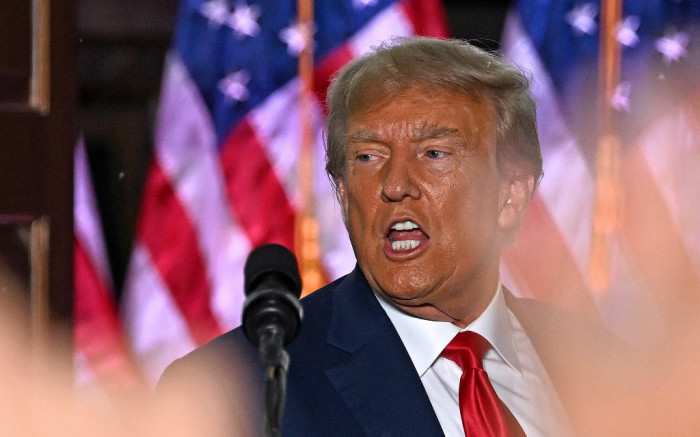
South Korean President Yoon Suk Yeol speaks with Japanese Prime Minister Fumio Kishida and Chinese Premier Li Qiang (both not pictured) during their trilateral meeting at the Blue House in Seoul, South Korea, Monday, May 27, 2024. (Jeon Heon-kyun/Pool Photo via AP)
SEOUL, South Korea (AP) — North Korea announced plans to launch a rocket apparently carrying its second military spy satellite within eight days starting Monday, drawing sharp criticism from its neighbors South Korea and Japan.
The announcement of the planned launch, which is banned under UN resolutions, came as South Korean President Yoon Suk Yeol and Japanese Prime Minister Fumio Kishida met Chinese Premier Li Qiang in Seoul for their first trilateral meeting in more than four years.
The Japanese coast guard said it had been informed by North Korea of the planned launch of a “satellite rocket” and had urged caution in the waters between the Korean peninsula and China and east of the Philippine main island of Luzon from Monday until midnight on June 3.
North Korea provides its launch information to Japan because the Japanese Coast Guard coordinates and disseminates maritime security information in East Asia.
North Korea’s planned launch is believed to be an attempt to put its second military spy satellite into orbit. South Korea’s military said on Friday it had discovered signs of suspected preparations for the launch of a spy satellite at North Korea’s main launch site, Tongchangri, in the northwest of the country.
The UN bans North Korea from launching any satellites, which it sees as a cover for testing long-range missile technology. But North Korea has categorically insisted it has the right to launch satellites and test missiles. It says spy satellites would allow it to better monitor the moves of the US and South Korea and improve the precision-strike capability of its nuclear-capable missiles.
“Any launch (by North Korea) of ballistic missile technology would directly violate UN Security Council resolutions and undermine regional and world peace and security,” Yoon said at the start of the meeting with Kishida and Li. “If North Korea continues its launch despite the international warning, I believe the international community must take strict action against it.”
Kishida urged North Korea to cancel the launch. China is a North Korean ally, and Li did not mention the North Korean satellite.
In telephone talks on Monday, senior diplomats from Japan, South Korea and the United States agreed to call on North Korea to abort the launch. South Korea’s Unification Ministry, which is responsible for North Korea, called a satellite launch by the North “a provocation that seriously threatens our security and the security of the region.”
Later Monday, South Korea mobilized 20 fighter jets for an exercise designed to demonstrate its determination to punish North Korea if it provokes them, the South Korean military said. Japanese officials said their missile interceptor systems remained ready to shoot down any debris from a North Korean missile if it falls into Japanese territory.
Last November, North Korea launched its first military reconnaissance satellite into orbit, with the goal of building a space-based surveillance network to counter increasing military threats from the United States. North Korean leader Kim Jong Un later told a ruling party meeting that the country would launch three more military spy satellites in 2024.
There are widespread doubts as to whether North Korea’s satellites can produce militarily significant images. However, some civilian experts believe that operating multiple satellites could help North Korea continuously monitor large enemy targets.
The latest launch notification to Japan mentions the same danger zones for possible rocket debris as before North Korea’s last launch. This suggests that North Korea will use the same first and second rocket stages as before, said Chang Young-keun, a rocket expert at the Korea Research Institute for National Strategy in Seoul.
Chang said the launch of three satellites this year will allow North Korea to obtain more frequent images from sites in South Korea, Japan and the U.S. Pacific territory of Guam.
Since 2022, North Korea has been conducting a provocative series of missile tests to modernize and expand its weapons arsenal. In response, the United States, South Korea and Japan have strengthened their security partnership. Experts say North Korea likely believes that an expanded weapons arsenal would increase its influence in future diplomacy with the United States.
___
Yamaguchi reported from Tokyo.
___
Follow AP’s Asia-Pacific coverage at https://apnews.com/hub/asia-pacific






Recent Comments